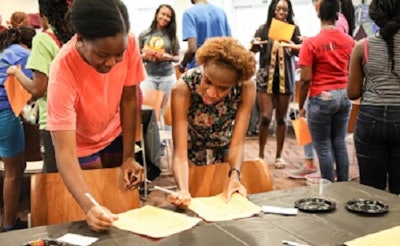With $25,000 in funding from a two-year college-completion grant, the Department of Residence Life at Texas A&M University (TAMU) created two social support groups for African-American and Hispanic students to increase their comfort and confidence in college.
In the two years since, the social support groups – AFAM and Aggie Familia – have served as a space for the historically underrepresented students to feel included on campus. Particularly, it affords the students an opportunity to ask the challenging questions around navigating their experiences as students of color.
 An event for African-American and Hispanic students in the AFAM social support group at Texas A&M.
An event for African-American and Hispanic students in the AFAM social support group at Texas A&M.“Our university is very big on the Aggie family, and that’s why AFAM and Aggie Familia seem to fit in,” said Dr. Carol D. Binzer, director of administrative and support services in the Department of Residence Life at Texas A&M. “You’re not differently an Aggie, but you can be a subset for the purposes of support.”
A little more than 3,000 Hispanic students and 500 African-American students live on Texas A&M’s campus. A majority of them are first-generation college students.
“As someone from the Rio Grande Valley, where Hispanics are the majority of the population, it was difficult becoming the minority overnight,” said Maria Villalpando, a TAMU student who had trouble connecting with other students of color on the expansive campus.
She said Aggie Familia helped facilitate connections between people of color and acted as “a support system that understands [minority students’] challenges that other people might not.” She reciprocated the support and helped others by giving them advice based on her own experience as a first-generation Hispanic woman at the school.
Similarly, Ricardo Pena, another TAMU student, said that he came to school believing he was well prepared on what to do and how to find resources after participating in a college readiness program.
Even though he immersed himself in campus organizations upon entering college, walking around campus still feels uncomfortable to him.
“I have experienced long looks, weird faces and sometimes people making a longer trip around me to simply not have to pass next to me, almost as if they feared I would harm them,” he said.
His experience participating in Aggie Familia connected him with a group of friends and supportive staff.
“I have interacted with so many wonderful people, some graduates of TAMU and some from all around the nation, that all have a single goal in mind – to be there for us when we need them,” Pena said. “They have extensive knowledge of every single topic I may have a question on and if they don’t, they know someone who is more than willing to help me.”
He added, “They have a dedication to helping us, and seeing someone as committed to help others gives us the motivation to push harder and not give up.”
Nearly 1,000 students have participated in social gatherings hosted by AFAM and Aggie Familia every three weeks throughout the semester. In addition to meeting other students of color in the residence halls, African-American and Hispanic students engage with faculty, alumni and staff mentors who share stories and tips from their college experiences, receive additional supportive resources and connect with the leaders of student organizations that are identity-driven, Binzer said.
 Dr. Carol D. Binzer
Dr. Carol D. BinzerOfficials in the Department of Residence Life — a part of the Division of Student Affairs — initially recognized the need for the two social support groups after institutional studies found that majority students’ outcomes—due to living on campus—differed from the outcomes of minority students living on campus.
For Black and Latinx students living on campus, the “edge” over off-campus peers was “still better, but not quite as great,” Binzer said. School officials then asked themselves, “What about [these students’] experience maybe isn’t as equitable?” and sought to find out how to possibly replicate models of support that students of color received at home before entering college.
“Sometimes, if a situation is new to you, you don’t even know what you don’t have, so it’s been a little bit tricky to find out what we can do for them that isn’t already being done,” Binzer said. Even when information, resources or support are available, students may be unfamiliar with the services or they do not “feel as welcome” on campus, she added.
However, the approach to supporting the students is now more personal than “giving them a sheet [of resources or multicultural organizations] and letting them explore,” Binzer said, citing “things we do generally in the residence halls, but with just them in mind.”
Since the creation of AFAM and Aggie Familia, Binzer said, African-American and Hispanic students’ retention percentages and grades have gone up. She credited events such as “money sessions” and activities in the computer lab or writing center where staff help students complete academic papers and scholarship applications.
Grant funding will end at the end of this academic year, Binzer said, and Residence Life officials are discussing how to move forward with the social support groups. Uncertainty about whether the groups will have the same structure of outside support without the grant funding is offset by the fact that Residence Life staff has learned about the experiences and needs of their African-American and Hispanic students living on campus.
The impact of the social support groups on its students is long-lasting, as students who participate in the groups note that AFAM and Aggie Familia have made a positive difference in their collegiate experience through people who care about them.
“Being part of such a large university, it is easy to become just another number,” Villalpando said. “However, the fact that this program exists to benefit people like me is awe-inspiring. I truly feel like I am part of the Aggie family.”
Tiffany Pennamon can be reached at [email protected]. You can follow her on Twitter @tiffanypennamon.















